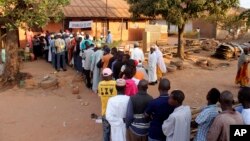BISSAU —
Observers from the West African regional bloc ECOWAS on Monday said Guinea-Bissau's weekend election was free and fair, and called on international donors to restart cooperation suspended in the wake of a 2012 coup.
Bissau-Guineans flocked to the polls in large numbers on Sunday to vote in long-delayed legislative and presidential polls meant to bring stability to the former Portuguese colony after years of putsches and political infighting.
No elected president has completed a five-year term in Guinea-Bissau, which has become a major transit point for smugglers ferrying Latin American cocaine to Europe.
“The election was conducted according to international standards and the election was peaceful, free, fair and transparent,” the ECOWAS observer mission said in a statement.
The mission noted a few isolated problems in certain areas, including a shortage of ballot papers and an attack by the national guard on some supporters of one candidate, but said these did not impair the overall conduct of the election.
The last election in 2012 was aborted when troops under army chief Antonio Indjai stormed the presidential palace days before a presidential second-round vote was due to take place, plunging the country into chaos.
Many in Bissau hope a successful transition to democracy can unlock donor funding for one of the world's poorest countries, including 110 million euros in European Union aid frozen after a 2011 military uprising.
Front runner Vaz
“[ECOWAS] urges all development partners to expedite the lifting of sanctions imposed on the country and to extend financial support towards meeting the urgent post-electoral task of reconciliation, reconstruction and reform,” said the mission led by the former interim president of Liberia Amos Sawyer.
An EU election observation mission also said the election was well-organized and conducted in a calm atmosphere.
Results are due by Friday. If no candidate wins an outright majority in the presidential ballot, a second round will be held between the top two.
The front runner of 13 presidential candidates is Jose Mario Vaz, a former finance minister running for the dominant African Party for the Independence of Guinea and Cape Verde (PAIGC).
Vaz's candidacy is tainted by accusations from Bissau's attorney general of involvement in the embezzlement of a $12.5 million grant from Angola, something Vaz denies. His main challenger is former World Bank executive Paulo Gomes.
Guinea-Bissau, home to 1.6 million people, has dozens of remote islands and a jagged coastline of mangrove creeks that have made it a paradise for drug smugglers.
Indjai was indicted last year by a federal grand jury in New York on cocaine and weapons-trafficking charges but he escaped a sting operation to catch him that netted a former navy chief. Both men deny involvement in drug trafficking.
Bissau-Guineans flocked to the polls in large numbers on Sunday to vote in long-delayed legislative and presidential polls meant to bring stability to the former Portuguese colony after years of putsches and political infighting.
No elected president has completed a five-year term in Guinea-Bissau, which has become a major transit point for smugglers ferrying Latin American cocaine to Europe.
“The election was conducted according to international standards and the election was peaceful, free, fair and transparent,” the ECOWAS observer mission said in a statement.
The mission noted a few isolated problems in certain areas, including a shortage of ballot papers and an attack by the national guard on some supporters of one candidate, but said these did not impair the overall conduct of the election.
The last election in 2012 was aborted when troops under army chief Antonio Indjai stormed the presidential palace days before a presidential second-round vote was due to take place, plunging the country into chaos.
Many in Bissau hope a successful transition to democracy can unlock donor funding for one of the world's poorest countries, including 110 million euros in European Union aid frozen after a 2011 military uprising.
Front runner Vaz
“[ECOWAS] urges all development partners to expedite the lifting of sanctions imposed on the country and to extend financial support towards meeting the urgent post-electoral task of reconciliation, reconstruction and reform,” said the mission led by the former interim president of Liberia Amos Sawyer.
An EU election observation mission also said the election was well-organized and conducted in a calm atmosphere.
Results are due by Friday. If no candidate wins an outright majority in the presidential ballot, a second round will be held between the top two.
The front runner of 13 presidential candidates is Jose Mario Vaz, a former finance minister running for the dominant African Party for the Independence of Guinea and Cape Verde (PAIGC).
Vaz's candidacy is tainted by accusations from Bissau's attorney general of involvement in the embezzlement of a $12.5 million grant from Angola, something Vaz denies. His main challenger is former World Bank executive Paulo Gomes.
Guinea-Bissau, home to 1.6 million people, has dozens of remote islands and a jagged coastline of mangrove creeks that have made it a paradise for drug smugglers.
Indjai was indicted last year by a federal grand jury in New York on cocaine and weapons-trafficking charges but he escaped a sting operation to catch him that netted a former navy chief. Both men deny involvement in drug trafficking.





